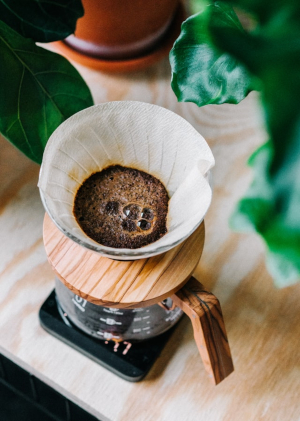What is the difference between cone vs basket filter? The taste of coffee is a result of many different factors. Did you know that the shape of a filter may have something to do with it, as well? Which coffee filter is better, cone or basket? Let’s explore.
This post contains references to products. We may receive compensation when you click on links to those products, at NO charge to you. Please visit this page for our Affiliate Policy.
I routinely brew coffee in a single serve machine. What is the difference between cone vs basket coffee filter? Do they impact the quality of my coffee beverage?
Owly Choice reader Samuel
Sam has come across a tough decision: which coffee filter should he use in his daily coffee brewing. Should he use a cone or a basket filter? What are the similarities and differences between a cone vs basket filter? Which one brews better coffee?
Coffee filters come in two different shapes: cone and basket. The main difference between cone and basket filters is the shape. While cone filters are typically cone-like (or conical), basket filters tend to be more bucket-like. Furthermore, cone filters brew smaller quantities of coffee (from 1 to 10 cups), whereas basket filters larger quantities of coffee (8 to 12 cups).
Last, but not least, one of the most important differences between cone vs basket filter is the quality and taste of coffee. Cone filters tend to yield more flavorful and better-extracted coffee.

Cone filters and basket filters are available as one of the following:
- paper filters, and
- permanent metal filters (some coffee makers come with their own metal mesh filters, but these can also be bought separately).
You can explore the difference between paper filters and permanent metal filters in our previous article.
When it comes to paper filters, the filter paper can be:
- bleached (using chlorine or oxygen to gain white paper), and
- unbleached (unprocessed with brown color). Unbleached paper is considered to be healthier than bleached paper.
Cone vs basket filter: similarities & differences
| Type | Cone | Basket |
|---|---|---|
| Shape | Conical or half cone | Bucket-like shape |
| Price for paper | $3.49+ per 100 units | $4.47+ per 100 units |
| Price for metal | $8.99+ | $2.69+ |
| Size | #1, #2, #4, #6 | 8-12 cup size |
| Coffee taste | Strong, flavorful and well extracted | May be uneven, incomplete |
Review: cone vs basket filters
Cone filters
Cone filters come in one conical, or cone-like, shape. In some cases, they can also have the shape of a half cone, meaning the shape I would get if I were to cut the pointy end off a cone, and create a new closing at the narrower end by folding the circular opening in two and by sticking the two sides together in a straight line.
Cone filters come in 4 different sizes:
- #1 size filters are used to brew one cup of coffee
- #2 size filters are used to brew 2 to 6 cups of coffee in electric coffee makers or 1-2 cups of coffee in non-electric coffeemakers
- #4 size filters are used to brew 8-10 cups using non-electric coffeemakers or 8-12 cups of coffee using electric coffeemakers
- #6 size filters are used to brew 10 cups of coffee or more using pour over/ non-electric coffee makers
One of the main differences between cone vs basket filters is the price. Cone filters tend to be a bit more expensive, because they are considered to brew better coffee than basket filters.
PROs and CONs of cone filters
The main advantage of using cone filters is a better and more complete coffee flavor.
The shape of the filter impacts the flow of water through coffee particles. This, in turn, enhances coffee ground saturation and extraction. As a result, coffee lovers are able to receive a tastier and more flavorful cup of coffee, because of more complete and even saturation.
In fact, A research project of Specialty Coffee Association (SCA) and Breville Corporation showed that cone filters brew better coffee. The shape of the filter plays a role as important as choosing the correct grind size in coffee flavor.
The study made using 45 coffee lovers showed the ability to change “the flavor profile of the brewed coffee in a very perceptible and statistically significant manner simply by changing the geometry of the filter basket.”
Basket filters
Just as their name suggests, basket filters come in basket-like shakes. They are also knows as bucket filters, they have flat bottoms, and their shape resembles that of cupcake liners.
Unlike cone filters, basket filters do not come in a large range of sizes. They are usually helpful to brew large quantities of coffee, anywhere between 8 to 12 cups at a time.
Basket filters are cheaper than cone filters, most probably because they are also less popular. One very important thing to keep in mind is that coffee machines will require a certain size and a certain filter shape. While most coffee machines can use conical filters, most basket style filters are designed for one specific brand or set of machines.
PROs and CONs of basket filters
One of the main advantages of basket filters is the price. Basket filters can be a lot cheaper than cone filters. Further, they come in bigger sizes, so they can be useful to brew large quantities of coffee.
The drawback of basket filters is that they only fit certain coffee makers that take basket filters, like Mr Coffee brewers. Another disadvantage is that, due to the flat bottom, coffee grounds might not get fully saturated with water, which can lead to a cup of coffee that lacks flavor or is weaker.
Which one is better: k-cup or coffee pod?
Owly’s conclusion: which is better: cone vs basket filter?
The shape of a filter influences the taste of your coffee. This is the main reason why cone filters win the race cone vs basket filter. In a basket filter, coffee grounds are on the flat bottom, and water is not able to evenly saturate them. Meanwhile, this problem does not exist in cone filters.
Although cone filters are a bit more expensive than basket filters, the price would not be a strong enough reason for me to choose a basket filter over a cone one.
Just remember, some coffee makers take only basket filters. In this case, you do not have much choice between cone vs basket filter.
What do you think?
What do you think about cone vs basket filter? Which one do you typically choose? Do you prefer coffee from basket vs cone filter?
Let us know in the comments!

JohnIL- Yep, it matters. I bought an inexpensive 5-cup drip machine recently that uses a cone filter. It made excellent coffee. Unfortunately, due to a problem with the machine, I had to return it. I replaced it with a coffeemaker with the basket-type filter. Temperature wasn’t noticeably different, and the water nozzle above the filter was virtually identical on both machines. The quality of my cup of coffee WAS different: the first one with the cone filter made a tastier cup of coffee. The new machine is going back to the store.
In general, I doubt it matters a lot if the grounds are equally saturated. It’s more important to have proper water temp and an equal flow over grounds. From a design standpoint the tapering of the cone would tend to make a stronger brew. Although the basket design could easily match this with a slower drip allowing grounds to soak longer in brew water. I think of Bunn systems that use taller baskets filters because of the fast brew spray but drip hole allows grounds to still release expected flavor. The type of filter material also can affect brewing such as paper being more or less porous and metal filters allowing more oils through.